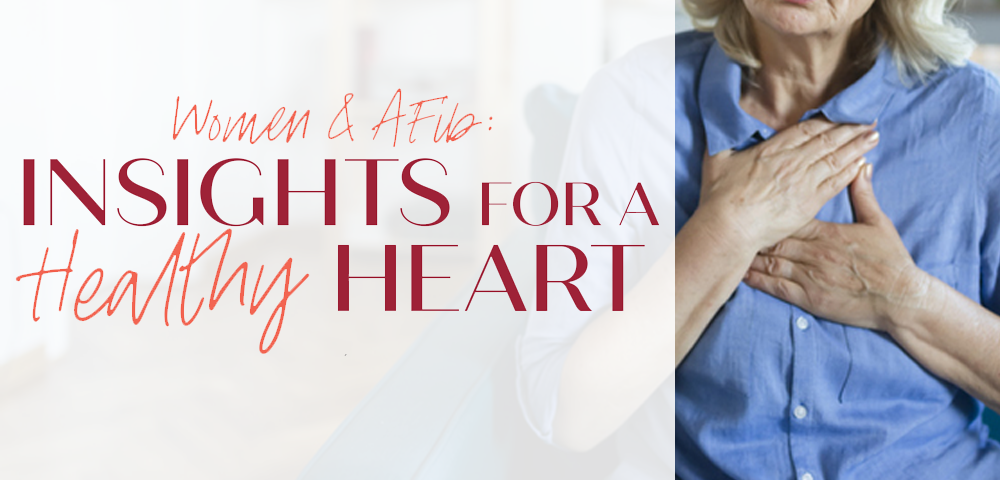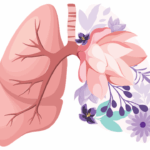
Women with AFib experience more severe symptoms, higher complication rates, and a greater risk of stroke.
A racing heart, fatigue, shortness of breath, and anxiety – these are all symptoms of atrial fibrillation (AFib), the most common type of heart arrhythmia. Equally prevalent in both sexes, AFib affects millions of people, but the diagnosis is more likely to be overlooked or delayed in women – in part because women with the condition tend to suffer more serious consequences and poorer outcomes. Women with AFib experience more severe symptoms, higher complication rates, and a greater risk of stroke, yet they’re less likely to be referred for advanced treatment. When it comes to AFib, prevention and early management are critical. So, what can you do to take control of heart health.
Lifestyle plays a key role in AFib prevention. Poor sleep or untreated sleep apnea is strongly linked to AFib. Aim for 7–9 hours per night, and consider a sleep study if you snore or wake up frequently. Chronic stress can increase cortisol levels and inflammation, potentially triggering episodes. Mindfulness, structured breathing, and daily nature walks can make a difference. Regular checkups, including routine blood pressure, cholesterol, and thyroid function monitoring, can catch issues early before they escalate into AFib.
Episodes of anxiety, fatigue, or shortness of breath are easy to dismiss as “just stress,” being out of shape, or some other benign cause. When in doubt, see a health care practitioner.
HEARFELT SUPPLEMENT SOLUTIONS
A heart-healthy diet is a frontline defense against AFib. Focus on foods that naturally support heart function:
- Leafy greens (like spinach, kale, and Swiss chard): Rich in magnesium and potassium, which help regulate heartbeat.
- Fatty fish (like salmon, sardines, and mackerel): High in omega-3 fatty acids, which reduce inflammation.
- Berries, beets, and pomegranates: Antioxidant- and quercetin-rich foods for blood vessel health.
- Nuts and seeds, especially walnuts and flax seeds: Packed with good fats and micronutrients that support cardiovascular health.
LIMIT CERTAIN FOODS
Certain foods and substances can worsen AFib symptoms or even trigger episodes. These are the top culprits:
Caffeine: While moderate intake is generally safe for many, some women with AFib are susceptible to stimulants. Notice how coffee, energy drinks, or chocolate affect your heart rate.
Alcohol: Even small amounts of alcohol can provoke AFib in some individuals. Known as “holiday heart syndrome,” this effect is widespread in women. Try limiting your intake or abstaining altogether if symptoms worsen after drinking.
Highly processed foods: These often contain high sodium levels, unhealthy fats, and additives that can increase blood pressure and inflammation.
HEART HEALTH HEROES
Several nutrients have shown promise in supporting healthy heart rhythm and overall cardiovascular function:
Coenzyme Q10 (CoQ10): An antioxidant that helps produce energy in heart cells. It may improve heart function and reduce the frequency of arrhythmia episodes.
Taurine: An amino acid that supports electrolyte balance and nervous system function. Some studies suggest it can help support healthy heart function.
Magnesium: Low magnesium levels are common in people with AFib. Supplementation may help calm the nervous system and reduce irregular heartbeats.
Potassium: Essential for regulating heartbeat, low levels of this mineral can disrupt healthy heart rhythm. Check with your doctor or pharmacist before starting potassium supplements if you’re taking any prescriptions, especially for blood pressure, or “water pills,” a.k.a diuretics.
EXERCISE: FRIEND OR FOE?
Exercise is incredibly beneficial for preventing and managing AFib – when done right. Moderate aerobic activity, like walking, swimming, cycling, or yoga, strengthens the heart, improves circulation, and helps with weight and stress management – all protective against AFib.
Extreme endurance training, however, may increase the risk of AFib in some individuals, especially if started suddenly or done excessively. Listen to your body and avoid pushing to the point of exhaustion.
Be empowered, not overwhelmed, to make change
Getting an AFib diagnosis can feel daunting and scary, but with the correct information and a proactive approach, women can manage risk and live whole, vibrant lives.












